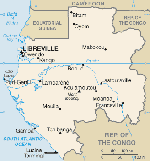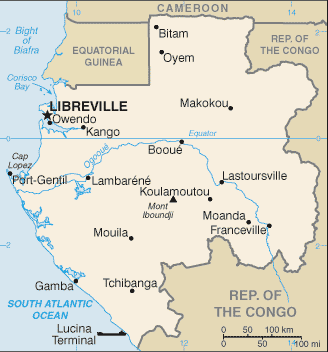 Gabon
Gabon
Country Specific Information
On this page » |
|
August 15, 2008
COUNTRY DESCRIPTION:
 Gabon is a developing nation on the western coast of central Africa. French is the official language; few Gabonese speak
English. Facilities for tourism outside the capital city, Libreville, are available, but they are often limited and can be
expensive. Read the Department of State Background Notes on Gabon for additional information.
Gabon is a developing nation on the western coast of central Africa. French is the official language; few Gabonese speak
English. Facilities for tourism outside the capital city, Libreville, are available, but they are often limited and can be
expensive. Read the Department of State Background Notes on Gabon for additional information.
ENTRY/EXIT REQUIREMENTS: A passport and visa are required. Proof of yellow fever vaccination is required for entry. Visas must be obtained in advance, as airport visas are no longer available. Travelers should obtain the latest information and details from the Embassy of Gabon, 2034 20th Street NW, Washington, DC 20009, telephone: (202) 797-1000, fax: (202) 332-0668. Travelers may also contact the Gabonese Consulate at 18 East 41st St., Ninth Floor, New York, NY 10017, telephone (212) 683-7371. Overseas, inquiries should be made to the nearest Gabonese embassy or consulate. All non-Gabonese citizens, with the exception of those bearing diplomatic or official passports, are required to obtain exit visas from the Direction Générale à la Documentation et l’Immigration (DGDI, formerly known as CEDOC) before departing Gabon.
Information about dual nationality or the prevention of international child abduction can be found on our web site. For further information about customs regulations, please read our Customs Information sheet.
SAFETY AND SECURITY: Americans should maintain security awareness at all times. There have been isolated incidents of civil unrest within the past year, both in the capital city and in the interior. Large gatherings such as sporting events or any other event where crowds have congregated to demonstrate or protest should be avoided.
Americans may contact the U.S. Embassy in Gabon for the most up-to-date information on safety and security. The Embassy informs the registered resident American community of security matters through a warden system (please see the Registration/Embassy Location section below for more information).
In the event of a fire, dial 18.
For the latest security information, Americans traveling abroad should regularly monitor the Department of State, Bureau of Consular Affairs’ website at http://travel.state.gov, where the current Travel Warnings and Travel Alerts, as well as the Worldwide Caution, can be found.
Up-to-date information on safety and security can also be obtained by calling 1-888-407-4747 toll free in the U.S. and Canada, or for callers outside the U.S. and Canada, a regular toll-line at 1-202-501-4444. These numbers are available from 8:00 a.m. to 8:00 p.m. Eastern Time, Monday through Friday (except U.S. federal holidays).
The Department of State urges American citizens to take responsibility for their own personal security while traveling overseas. For general information about appropriate measures travelers can take to protect themselves in an overseas environment, see the Department of State’s pamphlet A Safe Trip Abroad.
CRIME: In Gabon, petty thievery is common. Violent crime is more common in urban areas, and there have been cases of armed robberies in homes and in restaurants frequented by foreigners. Occasionally Americans or Europeans have been victims of crime.
The U.S. Embassy encourages Americans to take extra precautions when traveling in Libreville. To prevent carjacking, citizens are encouraged to travel with their automobile windows up and doors locked. Marginal neighborhoods, poorly lit streets, and unfamiliar areas of the city should be avoided, especially at night. Walking or running on the beach alone at night should be avoided. When dining in restaurants or visiting markets, it is recommended that one carry only minimal amounts of cash and avoid wearing excessive amounts of jewelry. If involved in an attempted robbery or carjacking, Americans are encouraged to comply with the attacker to avoid injury and to report all incidents to the police and the U.S. Embassy. Police response time to reports of crime can be slow.
Scams or confidence schemes do occur in Gabon. For general information on scams, see our Financial Scams webpage.
Credit cards are not widely accepted except at hotels, and because of the high rates of credit card fraud, their use outside major chain hotels is not recommended.
There have been incidents of sexual assault against foreigners.
INFORMATION FOR VICTIMS OF CRIME: The loss or theft abroad of a U.S. passport should be reported immediately to the local police and the nearest U.S. Embassy or Consulate. If you are the victim of a crime while overseas, in addition to reporting to local police, please contact the nearest U.S. Embassy or Consulate for assistance. The Embassy/Consulate staff can, for example, assist you to find appropriate medical care, contact family members or friends, and explain how funds could be transferred. Although the investigation and prosecution of the crime is solely the responsibility of local authorities, consular officers can help you to understand the local criminal justice process and to find an attorney if needed.
The local equivalent to the “911” emergency line in Gabon to reach the police is 177.
See our information on Victims of Crime.
MEDICAL FACILITIES AND HEALTH INFORMATION: Medical facilities in Gabon's major cities are limited, but they are generally adequate for routine or basic needs. Medical services in rural areas are generally unavailable. Additionally, some medicines are not available; travelers should carry necessary, properly labeled medications with them.
The U.S. Department of State is unaware of any HIV/AIDS entry restrictions for visitors to or foreign residents of Gabon.
Information on vaccinations and other health precautions, such as safe food and water precautions and insect bite protection, may be obtained from the Centers for Disease Control and Prevention’s hotline for international travelers at 1-877-FYI-TRIP (1-877-394-8747) or via the CDC’s website at http://wwwn.cdc.gov/travel/default.aspx. For information about outbreaks of infectious diseases abroad consult the World Health Organization’s (WHO) website at http://www.who.int/en. Further health information for travelers is available at http://www.who.int/ith/en.
MEDICAL INSURANCE: The Department of State strongly urges Americans to consult with their medical insurance company prior to traveling abroad to confirm whether their policy applies overseas and whether it will cover emergency expenses such as a medical evacuation. Please see our information on medical insurance overseas.
TRAFFIC SAFETY AND ROAD CONDITIONS: While in a foreign country, U.S. citizens may encounter road conditions that differ significantly from those in the United States. The information below concerning Gabon is provided for general reference only, and may not be totally accurate in a particular location or circumstance.
Travel by road in Gabon can be hazardous. It is recommended that you drive with your car windows up and the doors locked. Travelers are routinely stopped at police checkpoints within cities and on roads to the interior. Americans should comply politely if stopped, but avoid encouraging bribery if possible. Travelers should use extreme caution when driving after dark. Two-lane roads are the norm throughout Gabon. Roads to outlying cities have visible and hidden dangers that are profuse, including large potholes, absence of road signs, poor to non-existent streetlights, and the presence of pedestrians and animals. Construction work is often poorly indicated. Four-wheel drive vehicles are recommended for travel beyond the paved road to Lambarene, especially during the rainy season.
Roadside assistance and emergency medical services are available in Libreville, but they may not be dependable. Such services are nonexistent outside of the city. Service stations are available along main roads, but vehicle repair facilities are not always available. Drivers must have a valid international driver's license (available from AAA and the American Automobile Routing Alliance) when driving in Gabon.
Use of taxis is generally safe but does pose added risks. It is recommended that one use a hotel taxi when possible. Before riding in a taxi, check that the taxi has seatbelts and agree on a fare. Riding in a taxi alone or during late hours of the evening is not recommended and creates additional risk of becoming a victim of crime. Rail services are available, but infrequent, and travelers should be prepared for delays.
Please refer to our Road Safety page for more information.
AVIATION SAFETY OVERSIGHT: As there is no direct commercial air service to the United States by carriers registered in Gabon, the U.S. Federal Aviation Administration (FAA) has not assessed Gabon’s Civil Aviation Authority for compliance with International Civil Aviation Organization (ICAO) aviation safety standards. For more information, travelers may visit the FAA’s internet website at http://www.faa.gov/safety/programs_initiatives/oversight/iasa.
SPECIAL CIRCUMSTANCES: Gabon is a francophone country; travelers who do not speak French will face difficulties associated with the language barrier.
Americans should always carry identification with them in the event they are stopped at a police checkpoint.
Taking photographs of the Presidential Palace, military or other government buildings is strictly forbidden.
Official corruption is common, but offering bribes is not recommended.
Gabon is largely a cash economy. Credit cards are accepted at only a few major hotels. Travelers’ checks can be cashed or dollars exchanged for Central African Francs (CFA) at hotels and banks. ATMs are available in major urban centers, and dispense CFA.
CRIMINAL PENALTIES: While in a foreign country, a U.S. citizen is subject to that country's laws and regulations, which sometimes differ significantly from those in the United States and may not afford the protections available to the individual under U.S. law. Penalties for breaking the law can be more severe than in the United States for similar offenses. Persons violating Gabonese laws, even unknowingly, may be expelled, arrested or imprisoned. Penalties for possession, use, or trafficking in illegal drugs in Gabon are severe, and convicted offenders can expect long jail sentences and heavy fines. Engaging in sexual conduct with children or using or disseminating child pornography in a foreign country is a crime, prosecutable in the United States. Please see our information on Criminal Penalties.
CHILDREN'S ISSUES: For information see our Office of Children’s Issues web pages on intercountry adoption and international parental child abduction.
REGISTRATION / EMBASSY LOCATION: Americans living or traveling in Gabon are encouraged to register with the nearest U.S. Embassy or Consulate through the State Department’s travel registration web site so that they can obtain updated information on travel and security within Gabon. Americans without Internet access may register directly with the nearest U.S. Embassy or Consulate. By registering, Americans make it easier for the Embassy or Consulate to contact them in case of emergency.
The U.S. Embassy is located downtown on the Boulevard du Bord de Mer. The mailing address is Centre Ville, B.P. 4000, Libreville, Gabon. The telephone numbers are (241) 76-20-03 or (241) 76-20-04. The fax numbers are (241) 74-55-07 or (241) 76-88-49 and the web site is http://libreville.usembassy.gov/.
* * *
This replaces the Country Specific Information dated November 5, 2007 to update sections on Safety and Security, Crime, Information
for Victims of Crime, Medical Facilities and Health Information, Traffic Safety and Road Conditions, and Special Circumstances.

